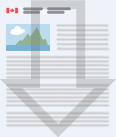Following the potato wart Ministerial Order and USDA Federal Order DA-2022-14 (PDF), industry in Prince Edward Island (PEI) is required to follow different inspection requirements for seed, processing and table stock potatoes and other regulated things originating from PEI. The following diagrams provide additional guidance on these inspection requirements.
On this page
- Requirements by type of potato product
- Sending soil, tubers, plants or plant parts for analysis
- Maintaining the segregation of restricted and unrestricted lots of potatoes
Requirements by type of potato product
Processing potatoes
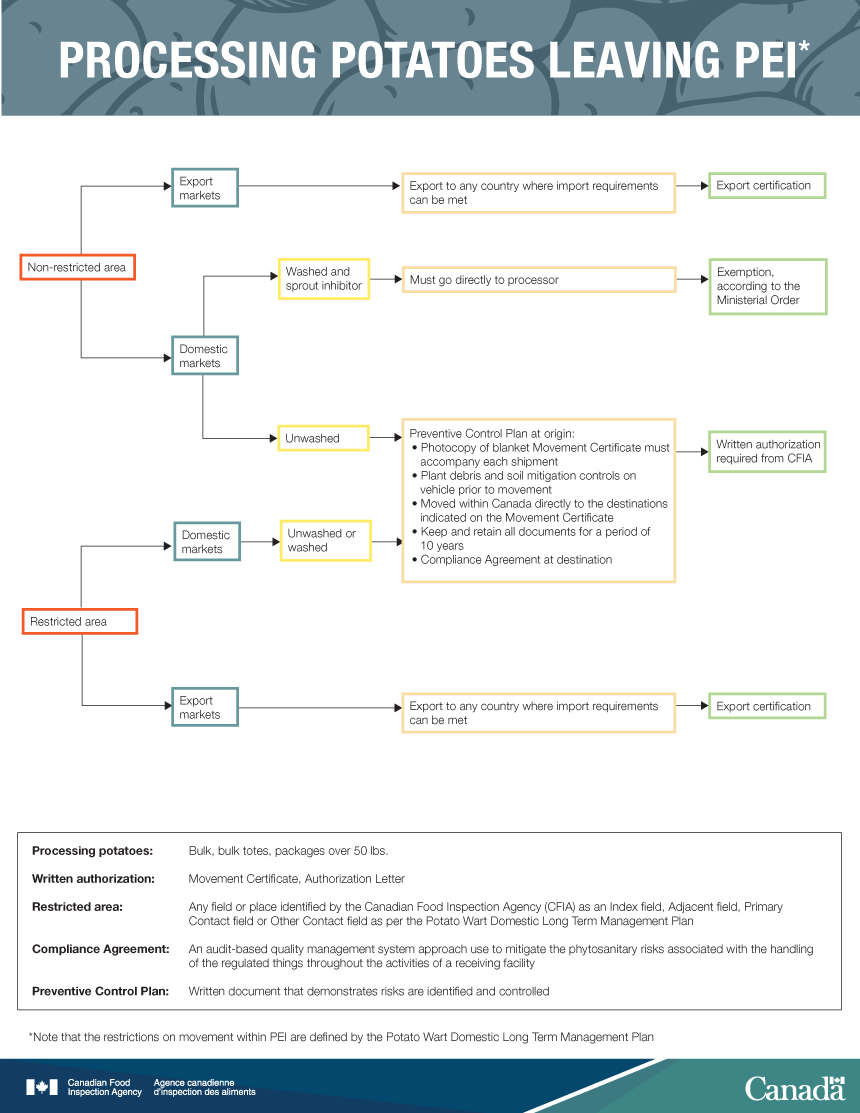
Description of infographic – Processing potatoes
Non-restricted area
- Export markets
- Export to any country where import requirements can be met
- Export certification
- Export to any country where import requirements can be met
- Domestic markets
- Washed and sprout inhibitor
- Must go directly to processor
- Exemption, according to the Ministerial Order
- Must go directly to processor
- Washed and sprout inhibitor
- Unwashed
- Preventive control plan at origin:
- Photocopy of blanket movement certificate must accompany each shipment
- Plant debris and soil mitigation controls on vehicle prior to movement
- Moved within Canada directly to the destinations indicated on the movement certificate
- Keep and retain all documents for a period of 10 years
- Compliance agreement at destination
- Written authorization required from CFIA
- Preventive control plan at origin:
Restricted area
- Domestic markets
- Unwashed or washed
- Preventive control plan at origin:
- Photocopy of blanket movement certificate must accompany each shipment
- Plant debris and soil mitigation controls on vehicle prior to movement
- Moved within Canada directly to the destinations indicated on the movement certificate
- Keep and retain all documents for a period of 10 years
- Compliance agreement at destination
- Written authorization required from CFIA
- Preventive control plan at origin:
- Unwashed or washed
- Export markets
- Export to any country where import requirements can be met
- Export certification
- Export to any country where import requirements can be met
Processing potatoes: Bulk, bulk totes, packages over 50 lbs
Written authorization: Movement Certificate, Authorization Letter
Restricted area: Any field or place identified by the Canadian Food Inspection Agency (CFIA) as an Index field, Adjacent field, Primary Contact field or Other Contact field as per the Potato Wart Domestic Long Term Management Plan
Compliance Agreement: An audit-based quality management system approach used to mitigate the phytosanitary risks associated with the handling of the regulated things throughout the activities of a receiving facility
Preventive Control Plan: Written document that demonstrates risks are identified and controlled
*Note that the restrictions on movement within PEI are defined by the Potato Wart Domestic Long Term Management Plan
Seed potatoes
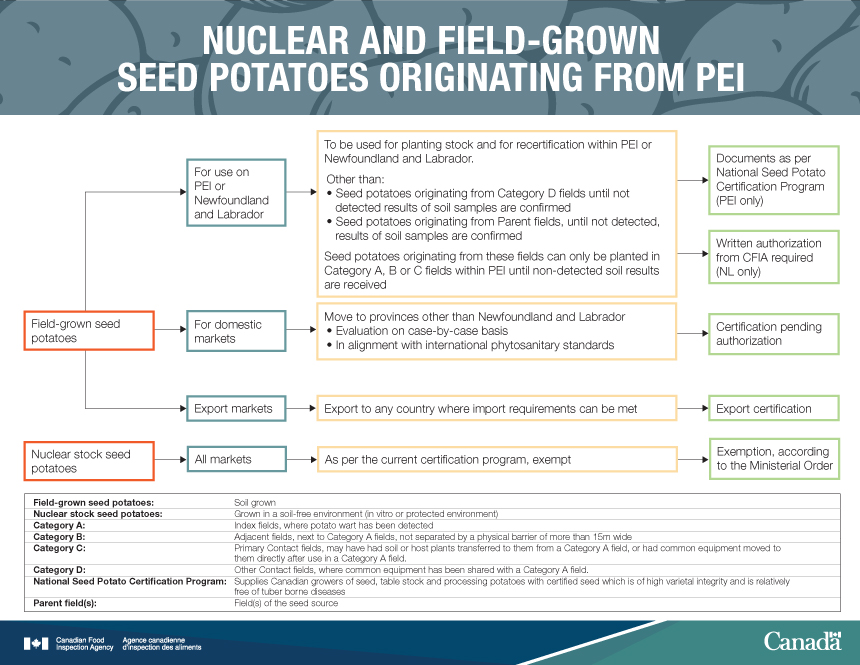
Description of infographic – Seed potatoes
Field-grown seed potatoes
- For use on PEI or Newfoundland and Labrador
-
- To be used for planting stock and for recertification within PEI or Newfoundland and Labrador
- Other than:
- Seed potatoes originating from Category D fields until not detected, results of soil samples are confirmed
- Seed potatoes originating from parent fields, until not detected results of soil samples are confirmed
- Seed potatoes originating from these fields can only be planted in Category A, B or C fields within PEI until non-detected soil results are received
- Documents as per National Seed potato Certification Program (PEI only)
- Written authorization from CFIA required (NL only)
-
- For domestic markets
- Move to provinces other than Newfoundland and Labrador
- Evaluation on case-by-case basis
- In alignment with international phytosanitary standards
- Certification pending authorization
- Move to provinces other than Newfoundland and Labrador
- Export markets
- Export to any country where import requirements can be met
- Export certification
- Export to any country where import requirements can be met
Nuclear stock seed potatoes
- All markets
- As per the current certification program, exempt
- Exemption, according to the Ministerial Order
- As per the current certification program, exempt
Field-grown seed potatoes: Soil grown
Nuclear stock seed potatoes: Grown in a soil-free environment (in vitro or protected environment)
Category A: Index fields, where potato wart has been detected
Category B: Adjacent fields, next to Category A fields, not separated by a physical barrier or more than 15m wide
Category C: Primary Contact fields, may have had soil or host plants transferred to them from a Category A field or had common equipment moved to them directly after use in a Category A field
Category D: Other Contact fields, where common equipment has been shared with a Category A field
National Seed Potato Certification Program: Supplies Canadian growers of seed, table stock and processing potatoes with certified seed which is of high varietal integrity and is relatively free of tuber borne diseases
Parent field(s): Field(s) of the seed source
Table stock potatoes
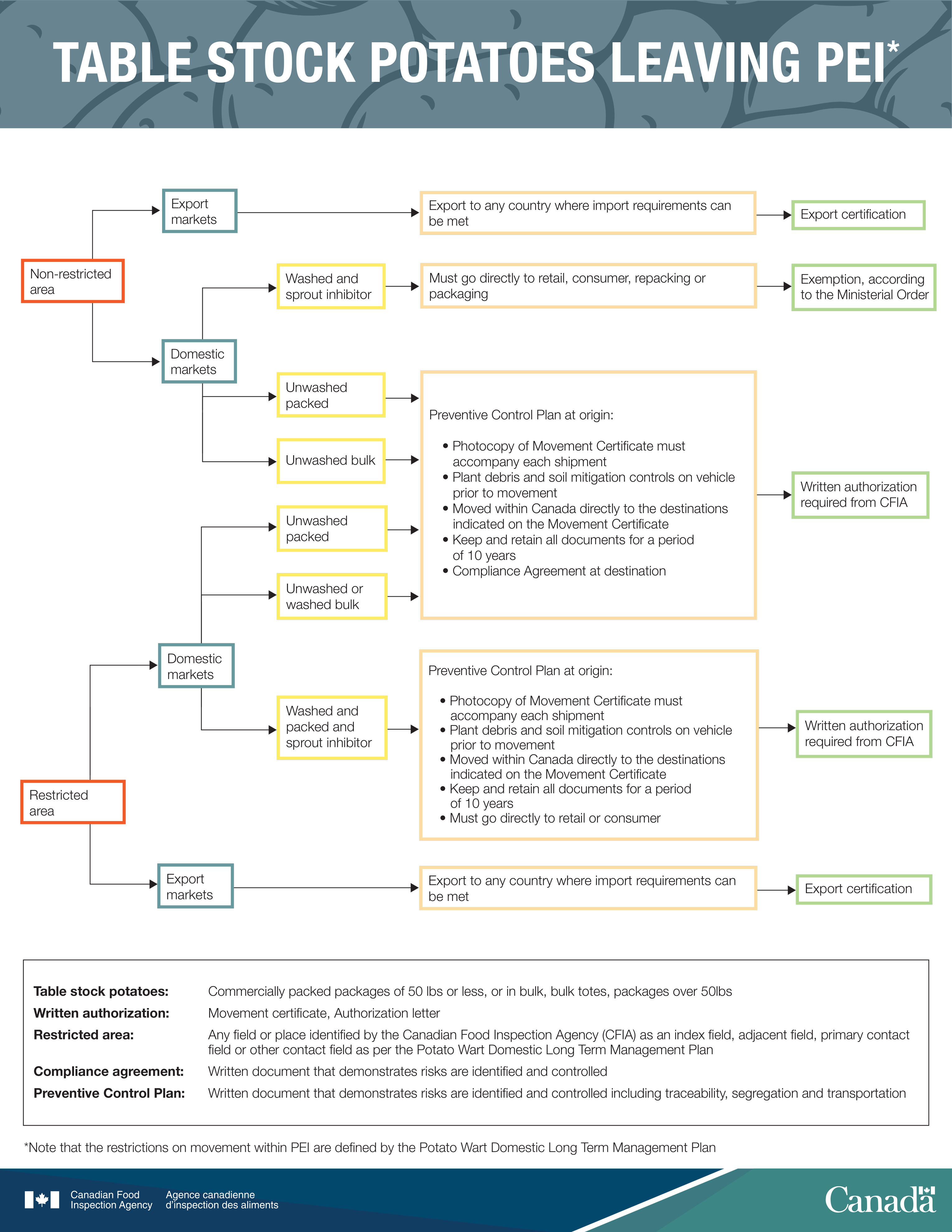
Description of infographic – Table stock potatoes
Non-restricted area
- Export markets
- Export to any country where import requirements can be met
- Export certification
- Export to any country where import requirements can be met
- Domestic markets
- Washed and sprout inhibitor
- Must go directly to retail, consumer, repacking or packaging
- Exemption, according to the Ministerial Order
- Must go directly to retail, consumer, repacking or packaging
- Unwashed packed
- Preventive Control Plan at origin:
- Photocopy of Movement Certificate must accompany each shipment
- Plant debris and soil mitigation controls on vehicle prior to movement
- Moved within Canada directly to the destinations indicated on the Movement Certificate
- Keep and retain all documents for a period of 10 years
- Compliance Agreement at destination
- Written authorization required from CFIA
- Preventive Control Plan at origin:
- Unwashed bulk
- Preventive Control Plan at origin:
- Photocopy of Movement Certificate must accompany each shipment
- Plant debris and soil mitigation controls on vehicle prior to movement
- Moved within Canada directly to the destinations indicated on the Movement Certificate
- Keep and retain all documents for a period of 10 years
- Compliance Agreement at destination
- Written authorization required from CFIA
- Preventive Control Plan at origin:
- Washed and sprout inhibitor
Restricted area
- Domestic markets
- Unwashed packed
- Preventive Control Plan at origin:
- Photocopy of Movement Certificate must accompany each shipment
- Plant debris and soil mitigation controls on vehicle prior to movement
- Moved within Canada directly to the destinations indicated on the Movement Certificate
- Keep and retain all documents for a period of 10 years
- Compliance Agreement at destination
- Written authorization required from CFIA
- Preventive Control Plan at origin:
- Unwashed or washed bulk
- Preventive Control Plan at origin:
- Photocopy of Movement Certificate must accompany each shipment
- Plant debris and soil mitigation controls on vehicle prior to movement
- Moved within Canada directly to the destinations indicated on the Movement Certificate
- Keep and retain all documents for a period of 10 years
- Compliance Agreement at destination
- Written authorization required from CFIA
- Preventive Control Plan at origin:
- Washed and packed and sprout inhibitor
- Preventive Control Plan at origin:
- Photocopy of Movement Certificate must accompany each shipment
- Plant debris and soil mitigation controls on vehicle prior to movement
- Moved within Canada directly to the destinations indicated on the Movement Certificate
- Keep and retain all documents for a period of 10 years
- Must go directly to retail or consumer
- Written authorization required from CFIA
- Preventive Control Plan at origin:
- Unwashed packed
- Export markets
- Export to any country where import requirements can be met
- Export certification
- Export to any country where import requirements can be met
Table stock potatoes: Commercially packed packages of 50 lbs or less, or in bulk, bulk totes, packages over 50 lbs
Written authorization: Movement certificate, Authorization letter
Restricted area: Any field or place identified by the Canadian Food Inspection Agency (CFIA) as an index field, adjacent field, primary contact field or other contact field as per the Potato Wart Domestic Long Term Management Plan
Compliance agreement: Written document that demonstrates risks are identified and controlled
Preventive Control Plan: Written document that demonstrates risks are identified and controlled including traceability, segregation and transportation
*Note that the restrictions within PEI are defined by the Potato Wart Domestic Long Term Management Plan
Plants for planting
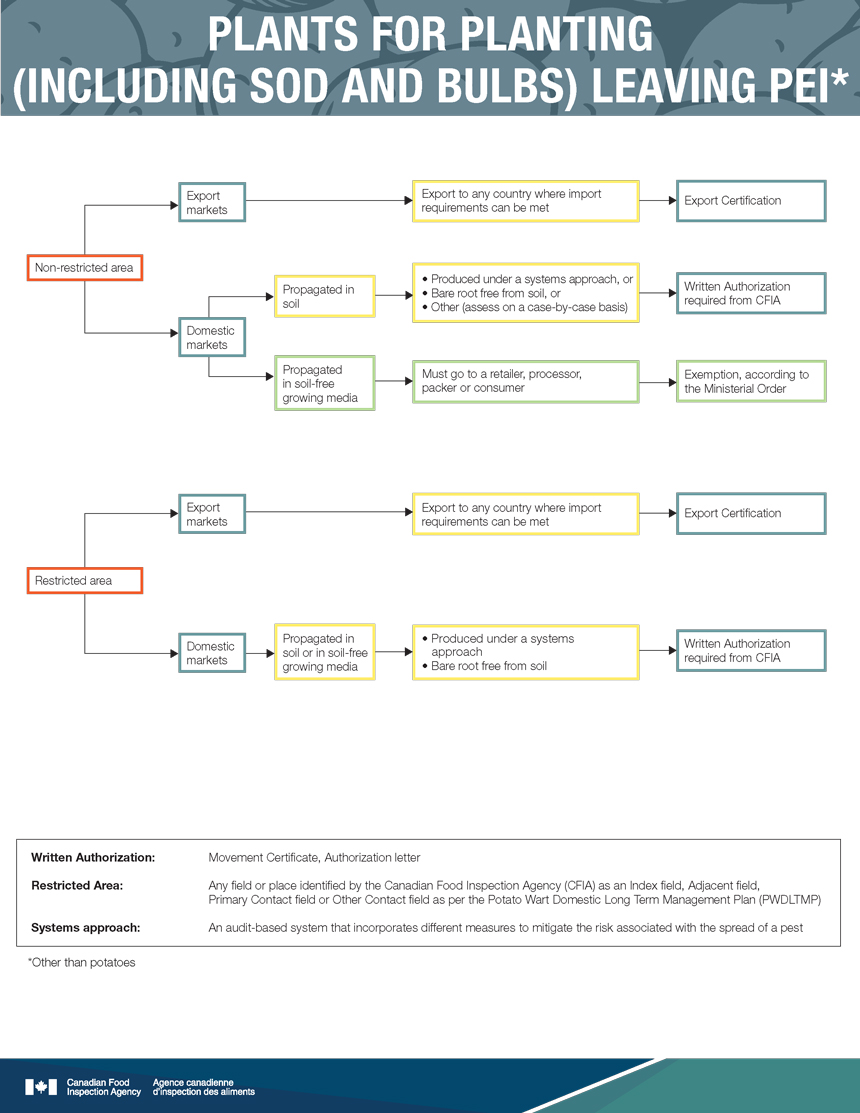
Description of infographic – Plants for planting
Non-restricted area
- Export markets
- Export to any country where import requirements can be met
- Export Certification
- Export to any country where import requirements can be met
- Domestic markets
- Propagated in soil
- Produced under a systems approach, or
- Bare root free from soil, or
- Other (access on a case-by-case basis)
- Written Authorization required from CFIA
- Propagated in soil-free growing media
- Must go to a retailer, processor, packer or consumer
- Exemption, according to the Ministerial Order
- Must go to a retailer, processor, packer or consumer
- Propagated in soil
Restricted area
- Export markets
- Export to any country where import requirements can be met
- Export Certification
- Export to any country where import requirements can be met
- Domestic markets
- Propagated in soil or in soil-free growing media
- Produced under a systems approach
- Bare root free from soil
- Written Authorization required from CFIA
- Propagated in soil or in soil-free growing media
Written Authorization: Movement Certificate, Authorization letter
Restricted Area: Any field or place identified by the Canadian Food Inspection Agency (CFIA) as an Index field, Adjacent field, Primary Contact field or Other Contact field as per the Potato Wart Domestic Long Term Management Plan (PWDLTMP)
Systems approach: An audit-based system that incorporates different measures to mitigate the risk associated with the spread of a pest
*Other than potatoes
Root crops
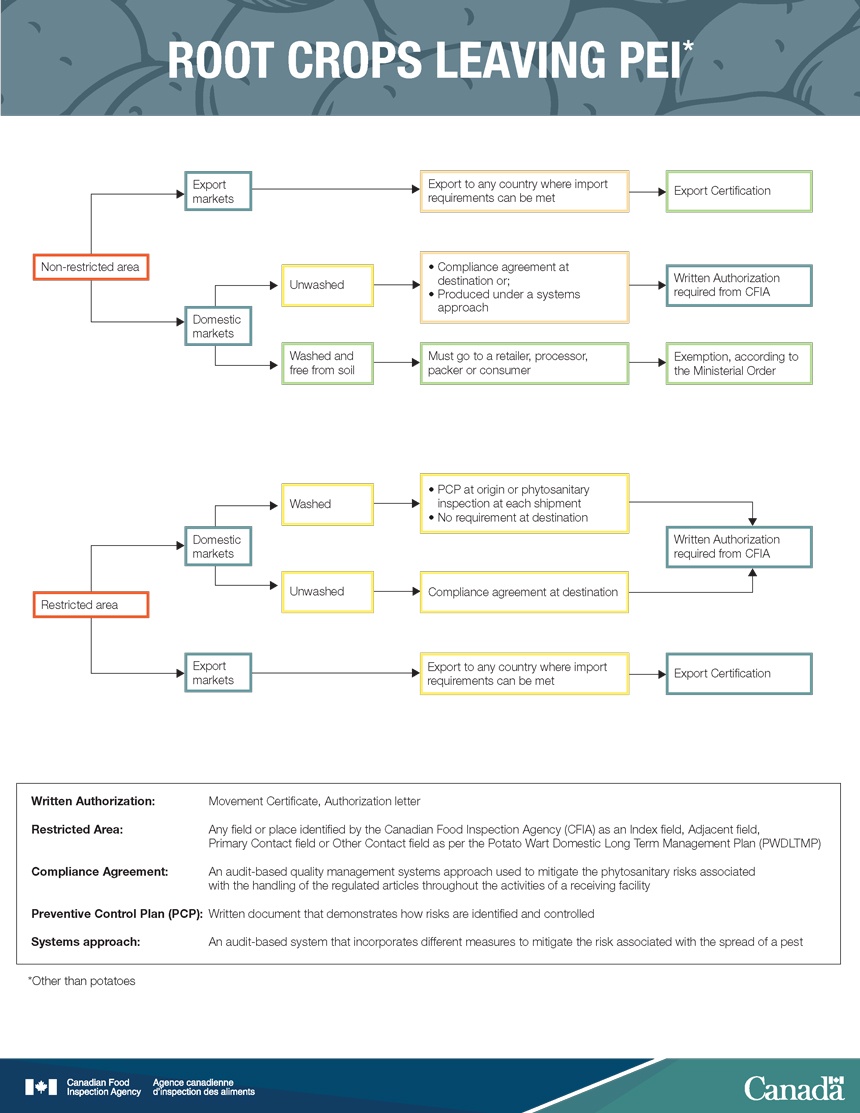
Description of infographic – Root crops
Non-restricted area
- Export markets
- Export to any country where import requirements can be met
- Export Certification
- Export to any country where import requirements can be met
- Domestic markets
- Unwashed
- Compliance agreement at destination, or
- Produced under a systems approach
- Written Authorization required from CFIA
- Washed and free from soil
- Must go to a retailer, processor, packer or consumer
- Exemption, according to the Ministerial Order
- Must go to a retailer, processor, packer or consumer
- Unwashed
Restricted area
- Domestic markets
- Washed
- PCP at origin or phytosanitary inspection at each shipment
- No requirement at destination
- Written Authorization required from CFIA
- Unwashed
- Compliance agreement at destination
- Written Authorization required from CFIA
- Compliance agreement at destination
- Washed
- Export markets
- Export to any country where import requirements can be met
- Export Certification
- Export to any country where import requirements can be met
Written Authorization: Movement Certificate, Authorization letter
Restricted Area: Any field or place identified by the Canadian Food Inspection Agency (CFIA) as an Index field, Adjacent field, Primary Contact field or Other Contact field as per the Potato Wart Domestic Long Term Management Plan (PWDLTMP)
Compliance Agreement: An audit-based quality management systems approach used to mitigate the phytosanitary risks associated with the handling of the regulated articles throughout the activities of a receiving facility
Preventive Control Plan: Written document that demonstrates how risks are identified and controlled
Systems approach: An audit-based system that incorporates different measures to mitigate the risk associated with the spread of a pest
*Other than potatoes
Restrictions on the movement of potatoes within PEI are defined by the Potato Wart Domestic Long Term Management Plan.
Sending soil, tubers, plants and plant parts for analysis
Movement restrictions also apply to:
- soil samples being sent for analysis, including nutrient analysis
- potato tubers, including those being sent for bacterial ring rot or chemical residue testing
There may also be restrictions on in-province movement depending on the potato wart field classification.
If you need to send soil and/or other regulated things for analysis, ensure that:
- soil and tubers for anlaysis that have not been washed, free of soil and sprout inhibited, must be sent directly to a CFIA-approved lab with biosecurity measures in place to help mitigate risks for materials originating from a potato wart regulated area. A written authorization to support the movement of the product can then be issued by the CFIA.
- the movement of plants and plant parts, including plant stems, leaves, petioles and root crops, out of PEI may require written authorization, particularly if they are not free from soil and/or if they originate from a potato wart restricted field.
If an out of province movement requires that you send a sample to a CFIA-approved lab, please contact your local CFIA office to confirm requirements.
Maintaining the segregation of restricted and unrestricted potato lots
As a grower or shipper, segregation between restricted and unrestricted lots of potatoes must be maintained.
When a lot of potatoes for consumption is destined for export to the United States, export certification requires that each lot be traceable to the field(s) of origin, and that the seed potatoes used to produce the lot presented for export did not originate from a potato wart restricted field.
A lot may be defined as one field or a portion of a field, or it may be defined by the producer and / or shipper as multiple fields meeting with the same phytosanitary status (e.g. all produced in a restricted field). Upon request, the grower or shipper must provide details to CFIA on how they define the specific lot presented for export.
Example: A shipper may decide to combine several fields of a specific variety, all originating from non-restricted fields, during storage. The shipper would be required to ensure that all fields in the 'lot' are traceable to the field(s) of origin and that the seed source used to produce each field was not produced in potato wart restricted fields.
For additional information to confirm seed eligibility, please contact your local CFIA office or the PEI Potato Board.
- Records must demonstrate how the integrity of the lot has been maintained from field to storage to grading to off island movement and how it has been physically segregated from any other lots that may have originated from restricted fields.
- Individual lots must remain physically segregated at all times to maintain traceability. Multiple lots of potatoes stored in the same bin must be separated by a physical barrier to prevent comingling of tubers or soil, or all potatoes will be considered part of a single lot.
Growers and shippers should be aware of the potential risks associated with combining fields in storage or combining multiple fields into a single lot. If one of the fields in a lot becomes restricted as a result of a new potato wart detection, the entire lot would be ineligible for export to the U.S.
